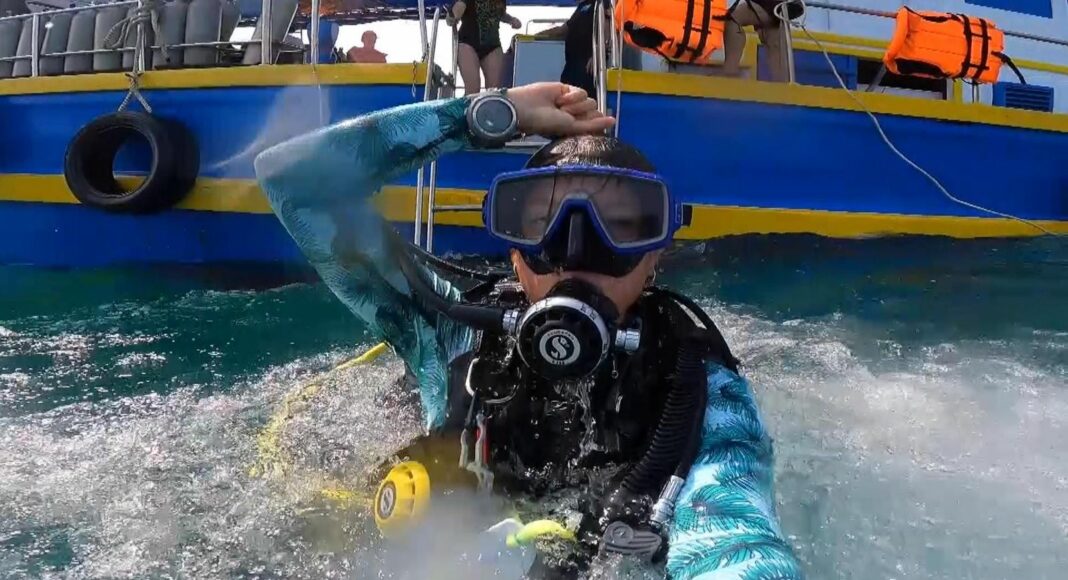Abandoned fishing nets littering the ocean are being transformed into COVID-19 protective gear in Thailand.
Environmentalists have been working with local fishing communities to rid the country’s waters of the deadly rubbish.
More than 700 fishers are taking part in the project and are being paid for the nets they collect.
Image:
A volunteer group has been carrying out clean-up dives. Pic: EJF
Discarded fishing gear is the deadliest form of plastic debris for marine life, responsible for harming 66% of marine mammal species, half of seabird species and all species of sea turtles, according to a report by the World Wildlife Fund (WWF).
Up to one million tonnes enters the ocean every year.
Campaigners for the Environmental Justice Foundation (EJF) have been working with members of 47 Thai fishing communities to collect the nets as well as finding ways to stop them from falling into the sea.
The group has also been carrying out clean-up dives with volunteers, one which Sky News joined.
The boat left the harbour in Rayong for a spot in the Gulf of Thailand where nets had been seen.
The divers were then split into teams that searched different areas of the sea.
Once the so-called “ghost nets” were spotted, the team had to measure and log each one while underwater.
Image:
The team measures and logs each ghost net they find. Pic: AMTEC
Image:
Ghost nets can stay afloat for decades. Pic: AMTEC
A record was also taken of any animals which were caught in the nets before they were gently cut loose and brought back to the boat.
“Ghost nets are actually really dangerous because once they fall into the ocean, they can stay afloat for decades,” said Ingpat Pakchairatchakul, a senior campaigner at the EJF.
“So either marine animals will be entrapped or they will digest the ghost nets which will lead to a health problem that will eventually lead them to die.”
While some of the nets were trapped several metres down, others could be clearly seen drifting on the surface.
Throughout the day, the pile of tangled debris on the deck swelled.
Image:
Animals can become trapped in the dangerous nets
As the divers tipped out the bags they had managed to collect, dead crabs and other crustaceans tumbled out along with an old battery.
“We find everything from [coral] to fish to a whole host of invertebrates,” said Rahul Mehrotra, marine scientist for Aow Thai Marine Ecology Centre (AMTEC), as he sifted through the piles.
“We’ve found at least eight genera of fish which is hundreds of species so far. We’re finding everything from crabs to large murex snails… these nets are designed specifically to entangle and catch marine life, so they are purpose-built to be very effective at that.”
Image:
Sea life is found in some of the nets
The nets have to be cleaned and separated before being taken to a local recycling factory where they will be shredded and repurposed.
Some have been melted down and turned into COVID-19 protective visors and alcohol spray bottles.
Money from some of the nets is being used to help villages involved in the project adapt to climate change.
“Their reception has been great because they have been the ones who have been exposed to the problem of marine plastic first-hand,” Mr Pakchairatchakul said.
“They have seen how that affects their livelihoods, but our project has been proing them financial benefits as well. When they collect nets for us, they get paid by our recycling partners so that amount of payment goes to support their conservation projects, emergency funds or even their livelihood.”
Image:
The project is also proing financial benefits to local communities
Despite the positive response, the task they face is huge.
Tens of thousands of small boats carry the nets in Thailand alone and the full scale of the ocean pollution they have caused is still unknown.
“It’s a massive challenge,” Mr Mehrotra admitted.
“We have the Band-Aid solution at the beginning, which is to actively remove the nets. That deals with the symptom. It prevents further things from getting entangled. Finding the source of the problem is another matter entirely. The first step is to get an understanding of the scale of the issue.”
To meet the challenge, campaigners and scientists are now meticulously logging every ghost net they spot in the hope they can find a way to finally rid the sea of the deadly waste.
Every day at 6.30pm, Sky News broadcasts the first daily prime time news show dedicated to climate change.
Hosted by Anna Jones, The Daily Climate Show is following Sky News correspondents as they investigate how global warming is changing our landscape and how we all live our lives.
The show will also highlight solutions to the crisis and show how small changes can make a big difference.




